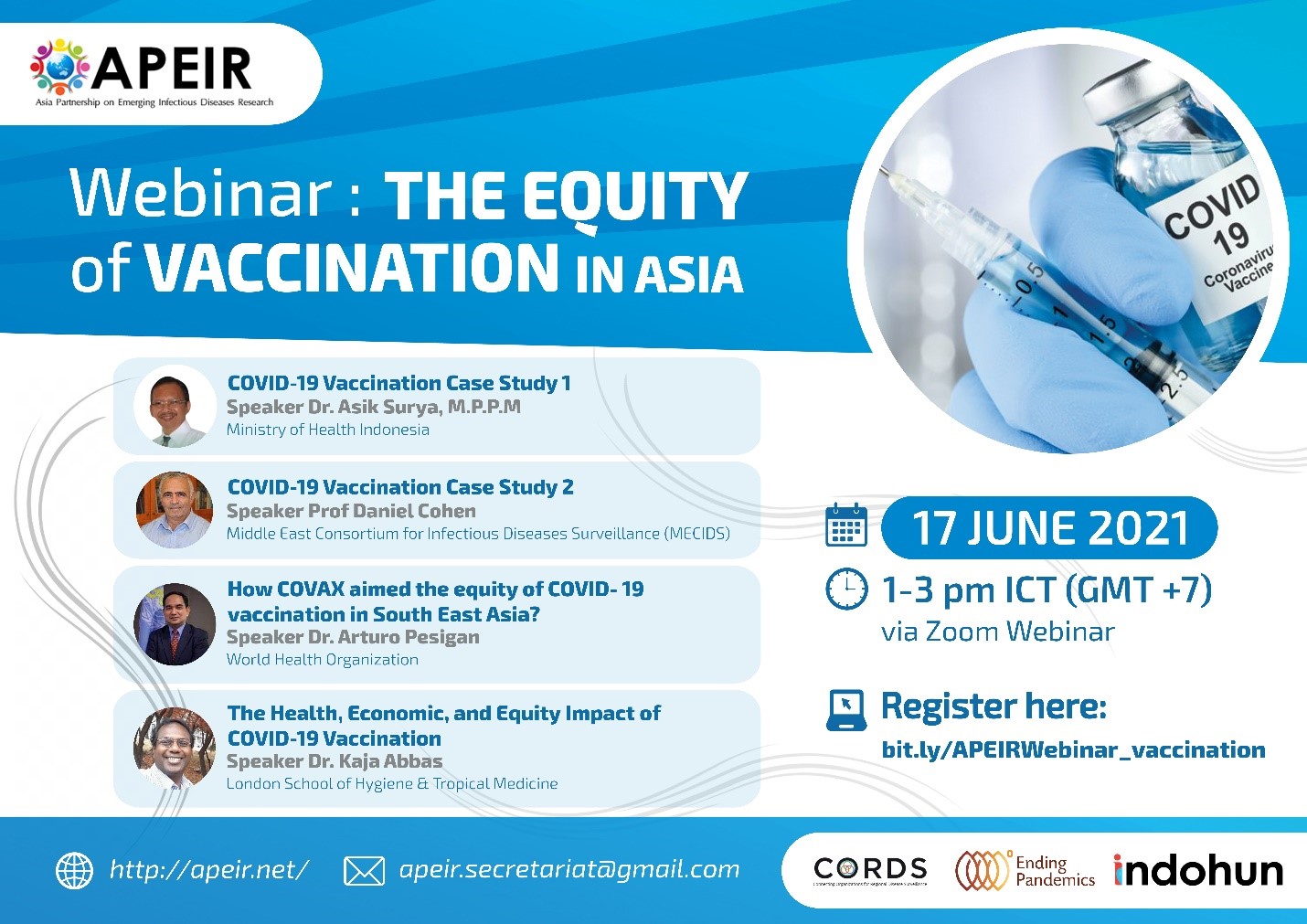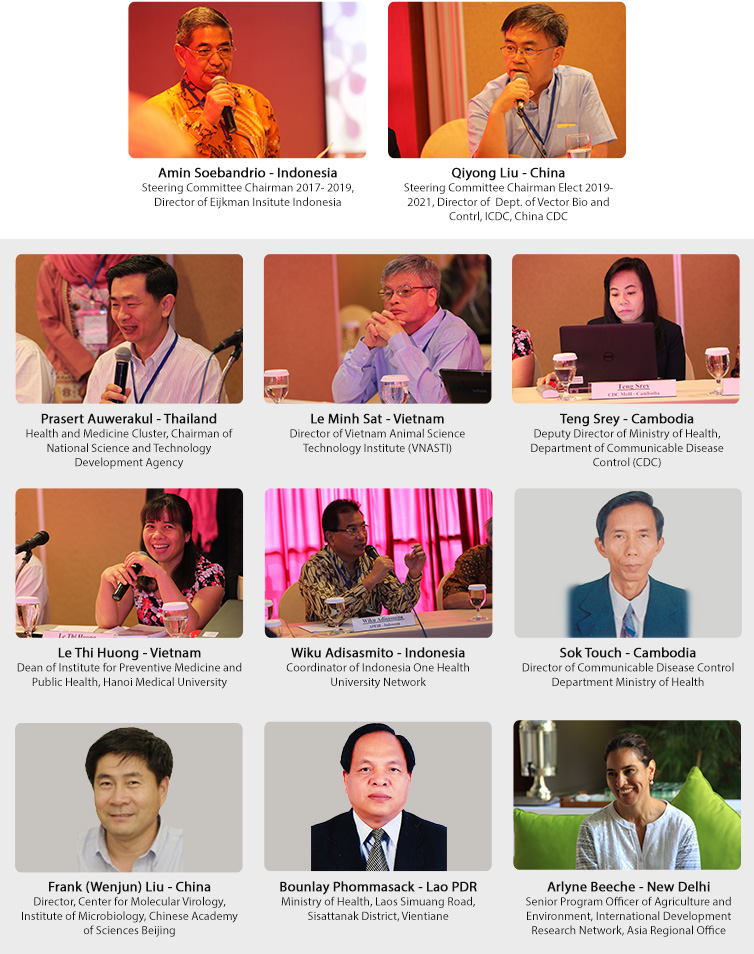- Details
- Category: Apeir Events

Registration Link:
http://bit.ly/APEIRWebinar_vaccination
Objectives:
- To describe current practice, plan, and scheme of COVID-19 vaccination from COVAX especially in South East Asia.
- To describe current practices and challenges of COVID-19 vaccination in key study countries
- To analyze the gap of needs and opportunities for improvement of the COVID-19 vaccination in key study countries
- To generate discussion among participants and speakers on best practices and challenges of COVID-19 vaccination in South East Asia
Background
Coronavirus pandemic has been affected more than 136 million people and caused of more than 2.9 million deaths in the world1. This pandemic alredy existed for more than a year, but the cases still increasing in all regions over the world2. Until 10th April 2021, Asia is the region with the highest percentage of daily confirmed COVID-19 cases. Around 43% of daily confirmed cases are come from Asia2. With the highest daily case, the total COVID-19 test in Asia is not as many as the daily confirmed cases there. Only India which performed more than 100 million tests in Asia, the other countries varied from 100,000 to 10 million total tests3. Therefore, vaccine is one of the critical ways which needed by Asia to control the cases, and to help prevent further illness and death.
COVID-19 vaccine development has been expedited since the early 2020 and several vaccines have been authorized and used since the late 2020. To achieve equitable access of COVID-19 vaccines over the world, WHO, CEPI, and Gavi has launched the vaccine pillar of the Access to COVID-19 Tools (ACT) Accelerator named as The COVID-19 Vaccines Global Access (COVAX). COVAX aims to end acute phase of COVID-19 pandemic by: 1) speeding up the development of safe and effective vaccines against COVID-19; 2) supporting the building of manufacturing capabilities; 3) and working with governments and manufacturers to ensure fair and equitable allocation of the vaccines for all countries – the only global initiative to do so4,5. Even if some efforts to achieve equitable access to COVID-19 vaccines has been established, there were some reports of vaccine rollout delay in some regions, including Asia.
From the Economist Intelligence Unit estimation, Asia and Africa will be region which will be fully covered by COVID-19 vaccines at the latest6. It estimated Asia will be fully covered from late 2020 to early 2023. Several reasons lie for the vaccination delay in Asia such as limited vaccine manufacturing capabilities, logistical challenges, and regulatory delays7. The vaccination delay in Asia might be a problem when the cases trend still increasing globally8. The number of cases in Asia have been decreasing at early 2021 but it start increasing since March 20218. Therefore, it is needed to analyze the vaccination progress in Asia.
Realizing the importance of collaboration, coordination, and communication in aiming the equity of vaccination, The Asia Partnership on Emerging Infectious Disease Research (APEIR) in collaboration with the Ending Pandemics, and Connecting Organization for Regional Disease Surveillance (CORDS), will hold a Webinar on The Equity of Vaccination in Asia. The event is designed to discuss the best practices and the opportunities for improvement of the COVID-19 vaccination in the countries. The webinar will be attended by APEIR and CORDS network countries. There will be presentations of vaccination case study from Cambodia and the Ending Pandemic network country.
Reference:
- COVID-19 Dashboard by the CSSE last update 4/13/2021. Coronavirus Resource Center: John Hopkins University. [internet] available from: https://coronavirus.jhu.edu/map.html
- Our World in Data. Daily confirmed COVID-19 cases last update 4/12/2021. [internet] available from: https://ourworldindata.org/grapher/daily-cases-covid-region
- Our World in Data. Test conducted per new confirmed case of COVID-19 4/11/2021. [internet] available from: https://ourworldindata.org/grapher/tests-per-confirmed-case-daily-smoothed?region=Asia
- https://www.who.int/initiatives/act-accelerator/covax
- https://www.who.int/emergencies/diseases/novel-coronavirus-2019/covid-19-vaccines
- BBC News. What’s causing vaccine delays in some Asian countries?. [online] available from: https://www.bbc.com/news/world-asia-56150755
- Channel News Asia. Commentary: Why is Asia Slow to get vaccinated?. [online] available from: https://www.bbc.com/news/world-asia-56150755
- WHO Coronavirus (COVID-19) Dashboard: Daily Situation by WHO Region last update 4/13/2021. [online] available from: https://covid19.who.int/
- Details
- Category: Apeir Events
Webinar : Addressing the Global Challenge of Antimicrobial Resistance
Save the date December 3rd, 2019 at 1:00 - 2:45 pm GMT +7
Read more: Webinar : Addressing the Global Challenge of Antimicrobial Resistance
- Details
- Category: Apeir Events
Top Zika experts met in Bali, Indonesia on 17th-18th November 2016. The meeting was organized by the Asia Partnership on Emerging Infectious Disease Research (APEIR) and the Mekong Basin Disease Surveillance Consortium (MBDS) which are part of Connecting Organizations for Regional Disease Surveillance (CORDS). CORDS membership covers South East Europe, the Middle East, Asia, including the Mekong Basin and South East Asia, East Africa and South Africa. The network works to reduce and prevent the spread of infectious diseases by exchanging information between surveillance systems globally.
There were 30 participants from 17 countries present including Uganda, Singapore, Bulgaria, China, Thailand and Brazil. Discussions included prospective Zikaresearch activity, training opportunities and testing. Actions were agreed to manage the risk of Zika transportation across borders and to mitigate against a larger global outbreak through collaboration. The meeting resulted in a joint statement from the networks containing global initiatives and collaborative actions to follow up afterwards
APEIR2016/Zika Meeting. Picture of George Misinzo from SACIDS
APEIR2016/Zika Meeting. Picture of Hishamuddin Badaruddin from Ministry of Health Singapore
.
FILE DOWNLOAD:
- Details
- Category: Apeir Events

APEIR Secretariat held APEIR Steering Committee Meeting on 28 – 29 July 2017 at the Century Park Hotel in Jakarta, Indonesia. The meeting title is Strengthening APEIR’s Role in the ASEAN and China Emerging Infectious Disease Research. The main objectives of the meeting were to incorporate APEIR’s research dissemination panel, conduct discussion among the APEIR country members and the ASEAN Secretariat, and APEIR’s internal business meeting.
Figure 1. Amin Soebandrio, chair of steering committee board
Participants to the meeting were the APEIR steering committee members, representatives of three APEIR regional research groups, Ministry of Health Republic of Indonesia, Ministry of Agriculture Republic of Indonesia, and development partners which are FAO and USAID. The first day was allocated for discussion with external partners and the second day was to conduct APEIR’s internal business. The meeting was chaired by Prof. Amin Soebandrio, the chair of steering committee board.
Pre- Steering Committee Meeting
The first day session consists of the APEIR’s research during 2013 – 2016 presentation and breakout discussion session. Dr. Suwit Chotinan, from Faculty of Veterinary Medicine, Chiang Mai University became the representatives of AMR Research Group to present their report entitled “Ecohealth Approach to Develop a Strategy for the Prudent Use of Antimicrobials to Control AMR in Human, Animal, and Environmental Health in Asia”. This research was conducted in Indonesia, Thailand, Lao PDR, Vietnam, and China. Then, Dr. Witthawat Wiriyarat, from Faculty of Veterinary Science, Mahidol University became the representatives of Wildlife Research Group to present their report entitled “Surveillance of Emerging Infectious Diseases in Wildlife Trade to Increase Awareness for Zoonoses Prevention and Wildlife Conservation”. This research was conducted in Cambodia, China, Lao PDR, Thailand, and Vietnam. After that, the last presentation was from Prof. Prasit Palittapongarnpim from Faculty of Science, Mahidol University who became the representatives of Biosecurity Research Group. He presented their research progress entitled “Mitigating Biosecurity Threats in Southeast Asia”. This research was conducted in Thailand, Lao PDR, and Vietnam, with main activities consist of research, surveillance, and training.
Figure 2. Presentations from Research Group Representatives and Discussion Session
The afternoon session was a breakout session, led by Prof. Wiku Adisasmito, the APEIR Secretariat Chairman to briefly presented overview of Antimicrobial, Food Safety, and Food Security in South East Asia. In this this session, opinion was gathered from the participants regarding current problems, and relevant stakeholders to respond the AMR issues in South East Asia. The participants were divided into two smaller groups to discuss and share their opinion about factors contributing to AMR and potential research topics for collaboration among the South East Asian countries.
Figure 4. Day 1 Group Meeting Picture
APEIR Steering Committee Meeting
The second day started with Prof. Amin Soebandrio leading the APEIR’s internal business meeting to reflect on APEIR’s current situation, including to discuss APEIR’s Sustainability and future strategic plans.
The members agree to give input on the roles and responsibilities document and send their letter of commitment. Prasit Palittapongarnpim declared that he will no longer continue his position and have someone else from Thailand to take his place.
Towards the end of the meeting, the steering committee members elected for the chairman and chairman elect. According to the discussion, it was decided that Prof. Amin Soebandrio will continue to serve as SC Chairman for 2017 – 2019, and will work closely with Prof. Qiyong Liu who will be the next Chairman for 2019 – 2021. The internal meeting resulted some follow-up actions for the secretariat, which are to coordinate with the research teams to develop regional publications for each research project and expand the next research initiatives. The members also agree to have an online meeting every two months to maintain the communication and updated activities.

Meeting Outputs:
- APEIR Organizational Structure Roles and Responsibilities
- APEIR Meeting Report 28 July
- AMR Presentation
- WLT Presentation
APEIR Steering Committee Board 2017- 2019




 Constancia Ayres
Constancia Ayres


